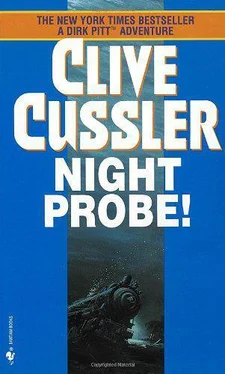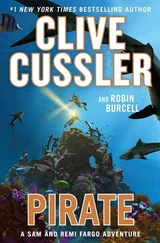A book lay in the lap; one clawlike hand was clamped on the engraved cover. The cold finger of dread etched a path down Pitt's neck. He had seen death close up before, and his reaction was always the same: a feeling of repugnance that slowly gave way to a frightening realization that he too would someday look like the rotting thing in the chair.
Hesitantly, as though he half expected Essex to awake, he pried the book loose. Then he switched on a desk lamp and flipped through the pages. It looked to be some sort of diary or personal journal. He turned to the front heading. The words seemed to rise up from the yellowed paper.
PERSONAL OBSERVATIONS
By
RICHARD C. ESSEX
FOR
APRIL OF 1914
Pitt sat down behind the desk and began reading. After about an hour he stopped and looked at the remains of John Essex, his expression of revulsion replaced with one that was filled with pity. "You poor old fool," he said with sadness in his eyes.
Then he turned off the light and left, leaving the former ambassador to England alone once again in a darkened room.
The air was heavy with the smell of gunpowder as Pitt moved behind a row of muzzle-loading gun enthusiasts at a shooting range outside Fredericksburg, Virginia. He stopped at a baldheaded man who sat hunched over a bench, peering intently down the iron sights of a rifle barrel that was fully forty-six inches in length.
Joe Epstein, a columnist for the Baltimore Sun during working hours and an avid black powder rifleman on weekends, gently squeezed the trigger. The report came like a sharp thump, followed by a small whiff of dark smoke. Epstein checked his hit through a telescope and then began pouring another powder charge down the long barrel.
"The Indians will be all over you before you've reloaded that antique," Pitt said with a grin.
Epstein's eyes brightened in recognition. "I'll have you know I can get off four shots a minute if I hurry." Using pillow ticking as wadding, he rammed a lead ball past the muzzle. "I tried to call you."
"I've been on the go," Pitt said briefly. He nodded at the gun. "What is it?"
"A flintlock. Seventy-five-caliber Brown Bess. Carried by British soldiers during the Revolutionary War." He handed the gun to Pitt. "Care to try it?"
Pitt sat down at the bench and sighted on a target two hundred yards away. "Were you able to dig up anything?"
"The newspaper morgue had bits and pieces on microfilm." Epstein placed a small amount of powder in the flintlock's priming pan. "The trick is not to flinch when the flint ignites the powder in the pan."
Pitt pulled the lock mechanism back. Then he aimed and eased the trigger. The primer flashed almost in his eyes and carried down the touchhole. The charge in the barrel exploded an instant later and his shoulder felt as if it had been rammed by a pile driver.
Epstein stared through the telescope. "Eight inches, two o'clock of dead center. Not bad for a city dude." A voice over a loudspeaker announced a cease-fire and the shooters laid down their pieces and began walking across the range to replace their targets. "Come along and I'll tell you what I found."
Pitt nodded silently and followed Epstein down a slope toward the target area.
"You gave me two names, Richard Essex and Harvey Shields. Essex was undersecretary of state. Shields was his British counterpart, deputy secretary of the Foreign Office. Both career men, the workhorse type. Very little publicity on either man. Carried out their work behind the scenes. Apparently they were rather shadowy figures."
"You're only icing the cake, Joe. There has to be more."
"Not much. As near as I can tell, they never met, at least in their official roles."
"I have a photograph showing them coming out of the White House together."
Epstein shrugged. "My four hundredth mistaken conclusion for the year."
"What became of Shields?"
"He drowned on the Empress of Ireland."
"I know about the Empress. A passenger liner that sank in the St. Lawrence River after colliding with a Norwegian coal collier. Over a thousand lives were lost."
Epstein nodded. "I'd never heard of her until I read Shields' obituary. The sinking was one of the worst maritime disasters of the age."
"Strange. The Empress, the Titanic and the Lusitania all went under within three years of one another."
"Anyway, the body was never found. His family held a memorial service in some unpronounceable little village in Wales. That's all I can tell you about Harvey Shields."
They reached the target and Epstein studied the hits. "A six-inch grouping," he said. "Pretty good for an old smoothbore muzzle-loader."
"A seventy-five-caliber ball makes a nasty hole," said Pitt, eyeing the shredded target. "Think what it would do on flesh."
"I'd rather not." Epstein replaced the target and they began walking back to the shooting line.
"What about Essex?" asked Pitt.
"What can I tell you that you don't already know?"
"How he died, for starters."
"A train wreck," answered Epstein. "Bridge collapsed over the Hudson River. A hundred dead. Essex was one of them."
Pitt thought a moment. "Somewhere, buried in old records in the county where the accident occurred, there must be a report listing the effects found on the body."
"Not likely."
"Why do you say that?"
"Now we've touched on an intriguing parallel between Essex and Shields." He paused and looked at Pitt. "Both men were killed on the same day, May twenty-eighth, nineteen fourteen, and neither of their bodies were ever recovered."
"Great," Pitt sighed. "It never rains…... but then I didn't expect it to be cut-and-dried."
"Investigations into the past never are."
"The coincidence between the deaths of Essex and Shields seems unreal. Could there have been a conspiracy?"
Epstein shook his head. "I doubt it. Stranger things happen. Besides, why sink a ship and murder a thousand souls when Shields could have simply been tossed over the side somewhere in the middle of the Atlantic?"
"You're right, of course."
"You mind telling me what this is all about?"
"I'm not sure where any of this is leading, myself."
"If it's newsworthy, I hope you'll let me in on it."
"Too early to throw in the open. It may be nothing."
"I've known you too long, Dirk. You don't involve yourself with nothing."
"Let's just say I'm a sucker for historical mysteries."
"In that case I've got another one for you."
"Okay, lay it on me."
"The river under the bridge was dragged for over a month. Not a single body of a passenger or crewman ever turned up."
Pitt stopped and stared evenly at Epstein. "I don't buy that. It doesn't figure that a few bodies wouldn't have drifted downriver and beached on the shoreline."
"That's only the half of it," Epstein said with a cagey look. "The train wasn't found either."
"Jesus!"
"Out of professional curiosity I read up on the Manhattan Limited, as it was called. Divers went down for weeks after the tragedy, but turned up zero. The locomotive and all the coaches were written off as having sunk in quicksand. Directors of the New York Quebec Northern Railroad spent a fortune trying to recover a trace of their crack train. They failed, and finally threw in the towel. A short time later, the line was absorbed by the New York Central."
"And that was the end of it."
"Not quite," Epstein said. "It's claimed that the Manhattan Limited still makes its ghostly run."
"You're kidding."
"Scout's honor. Local residents in the Hudson River valley swear to seeing a phantom train as it turns from the shore and heads up the grade of the old bridge before it vanishes. Naturally, the apparition only appears after dark."
"Naturally," Pitt replied sarcastically. "You forgot the full moon and the howling of banshees."
Читать дальше












